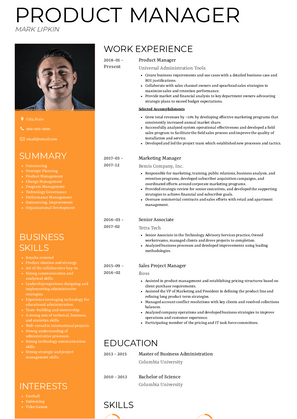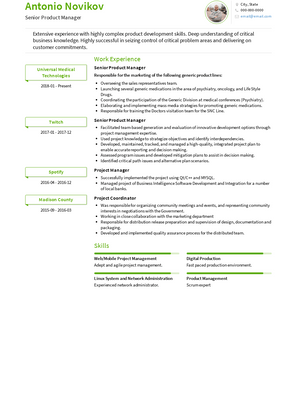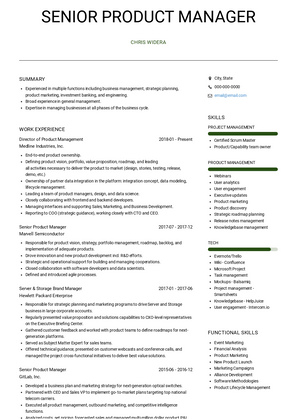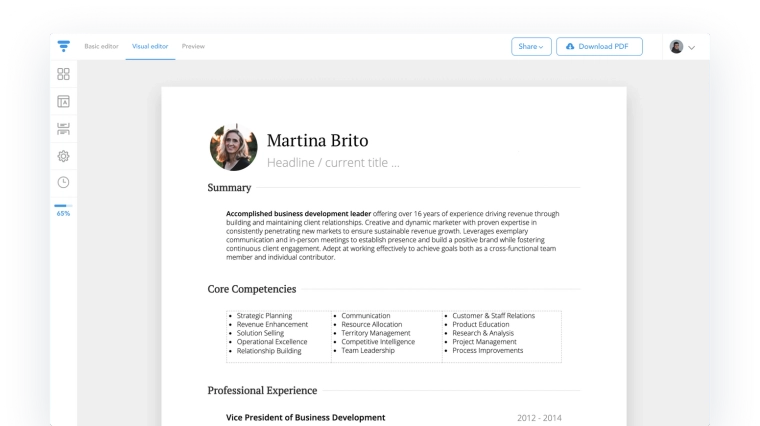Product Manger Resume Examples [+ 3 Samples]
This page provides you with Product Manager resume samples to use to create your own resume with our easy-to-use resume builder. Below you'll find our how-to section that will guide you through each section of a Product Manager resume.



Product Manager Resume Overview
Product managers are increasingly in-demand. According to The Product Manager, corporate interest in hiring product manager roles doubled between 2015 and 2020, and Glassdoor recently cited product manager as one of the top-five best jobs in the United States. Product managers deploy a wide range of knowledge each day, and can quickly become crucial to the success of their company. Along with these skills and seniority, of course, often comes high salaries and respect!
Of course, if you’re looking to secure a job as a product manager, you’ll first have to create a resume that stands out from the rest. The competition in this industry is fierce, and you’ll need to find a way to differentiate yourself. Thankfully, the VisualCV team is here to help you every step of the way! Read on for product manager resume examples to land you your dream job in 2022.
Note: Leverage AI to level-up your resume - Try our AI Resume Builder

What is a Product Manager?
Product managers work across departments and with many different people in order to successfully develop, launch, and track a product created by their company. For example, product managers may work for major technology companies such as Google or Apple to launch new services under the domain of the company. Product managers are skilled in multiple areas, which allows them to understand the different needs of each aspect of developing and launching a product. As a product manager, you should have knowledge of, and even experience in, UX design, technology, and business.
If you work as a product manager for a large company, it may also be your job to identify customer needs or a gap in the market. Your goal is then to determine how to meet that need, and how your proposed solution aligns with your company’s greater business goals. You’ll decide how to measure the success of your product, and manage a team through the process of creating and launching the product.
Do Product Managers Need to Code?
Many people interested in the exciting work product managers do wonder if their skills would be a match. Because product managers tend to work in tech-heavy industries, it is often assumed that product managers need to code in order to effectively do their jobs. However, coding isn’t usually a requirement for product manager jobs. While a basic understanding of code certainly would help product managers understand their team better, strictly speaking, coding is not a requirement for most product manager positions.
How to Write a Product Manager Resume
To write a product manager resume, think about your training first and foremost. Whether you’re applying as a new graduate or as someone with years of experience, keep in mind that hiring managers are looking for clear answers to one main question: are you qualified to perform the tasks required of a product manager?
In general, your product manager resume should contain the following:
- A summary
- Your experience
- Your Education
- Your skills, including any professional certifications
The Best Format for a Product Manager Resume
Writing your product manager resume in a reverse-chronological format is ideal when looking to show off your skills, experience and accomplishments.
Be sure to use big headings, clear and neat typeface and plenty of white space when constructing your resume. Export your product manager resume in PDF rather than Microsoft word - the result will be a professional and intact product to deliver to recruiters.
3 Product Manager Resume Summary Examples
Your summary should be short and to the point. This is the very first thing a recruiter will see, so make sure you’re putting your absolute best foot forward. Highlight your level of experience if you aren’t applying for entry-level positions, or your recent academic accomplishment if you’re a new graduate. Make sure to read the job description carefully and adjust your resume to fit it -- as long as what you’re saying is true, of course!
Many recruiters and companies now use Applicant Tracking Systems to automate and streamline the recruitment process. While this is a great benefit for companies, some applicants have been met with the frustration of their resumes not ever being seen by a real person -- if the resume doesn’t get past the ATS software, it’s usually discarded. Thankfully, VisualCV’s resume templates have been specifically designed to beat applicant tracking systems, making your product manager resume much more likely to make it in front of the right person.
The Wrong Way to Write a Product Manager Resume Summary
Your summary shouldn’t be too wordy or personal – that’s what your cover letter is for! This first step in your product manager resume exists to give hiring managers a brief glimpse into your personality and experience. Not all hiring managers agree that a resume summary is necessary, but if your resume summary is clear, to the point, and hones in on what the job description is asking for, include it!
DON’T Do This
- Product manager with experience in planning, launching, and tracking new app development for major technology companies.
Product Manager Resume Summary Sample
Product manager with 8 years of experience launching and monitoring new communication products from big-5 tech companies. Recently used leadership and strategy skills to meet 200% of Q4 revenue goal in a collaborative, fast-paced agency setting.
Professional Summary for a Product Manager
Product manager with independent app development experience. I’ve launched four apps over the last three years, leading to a combined 500,000 downloads. Expert in gamification and team building.
Product Manager Resume Summary Example
Highly experienced product manager with 15 years of developing, managing, testing, and troubleshooting SaaS products for major technology companies, resulting in an annual revenue increase of 80% YoY.
Do You Need a Product Manager Resume Objective?
Many people think resume objectives are a requirement for each and every product manager resume they write. However, product manager resume objectives are only recommended for people looking to transition into a product manager role from a different field.
Product Manager Resume Objective Example
Full-stack developer with 10+ years of experience shipping e-commerce applications, resulting in steady 50% YoY growth for the last five years. Looking to leverage my development and leadership experience into a product management role.
How to Describe Your Experience On Your Product Manager Resume
This is where you can really start bragging. Alison Green, author of Ask a Manager, highlights the single biggest resume mistake she saw in her time as a hiring manager: “Writing a resume that reads like a series of job descriptions.”
“The bullet points they use to describe what they did for each job just list activities and read like a job description for the role might,” she says. “For example, ‘edit documents,’ ‘collect data,’ or ‘manage website.’”
While writing the experience section of your product manager resume, focus on what you accomplished at each position.
Product Manager | CityScape Games | 2016-2022
- Coordinated with development teams to provide a unified message and vision for an annual output of 5 mobile games developed in-house each year
- Led a cross-functional team of 4 full-time employees and 2 contractors, forming strong relationships with stakeholders and reports
- Implemented pricing experiment that improved customer lifetime value by 41%
A hiring manager will be looking for the facts. What did you do at your previous jobs that made you stand out? For which projects did you receive the most praise? Providing tangible facts shows hiring managers that you have the potential to do the same at your next job.
You don’t necessarily need to discuss every job you’ve had in the past ten years. Instead, highlight the ones you’ve had which relate to the job position.
In your resume, your work history section should essentially start off by briefly discussing your current role. If you’re between jobs at the moment, talk about your previous employment. Remember, you can talk about any previous experience that might help the recruiter know more about you.
Here are a few tips you could use when it comes to filling out your work history:
Do (Summarize your work history)
- Include at least two work experiences.
- Let the recruiter know what you have enjoyed about these experiences.
- Showcase figures and percentages that demonstrate success.
DON’Ts (Summarize your relationship history)
- Avoid talking about bosses or previous employers.
- Explain why you were fired or let go from a past role.
- Talk about you if it doesn’t involve your work.
A Bad Product Manager Job Description on a Resume
Consider the following entry.
Product Manager | CityScape Games | 2016-2022
- Managed 5 mobile games each year
- Led a team of 6
- Improved customer lifetime value
This entry focuses on responsibilities you had at a previous job, but doesn’t describe what you achieved there. Hiring managers will likely already understand the types of tasks you performed at previous jobs. Your goal is to show them how good you are at performing those tasks!
How to List Skills On Your Product Manager Resume
What skills should you include on a Product Manager resume? While you should always try and list the skills that the job posting is asking for, there are some skills that come with the territory of being a product manager. Looking for more information about adding skills to your resume? Check out our resume skills guide here.
Top Product Manager Resume Skills in Demand in 2022
| Hard Skills for Product Managers | Soft Skills for Product Managers |
|---|---|
| Web Development Knowledge | Leadership |
| Technical Writing | Prioritization |
| Market Research | Research and Analysis |
| Knowledge of UX and UI | Motivation |
| Roadmapping Software | Teamwork |
| Business Knowledge | Flexibility |
| Economics Knowledge | Active Listening |
Top Soft Skills for Product Managers
Leadership
Any job title with “manager” in the name usually requires leadership skills, and product managers are no different. In product manager roles, you’ll be required to lead teams of all sizes towards a common goal. You might be working with direct reports, contractors, or even teams from other departments as you collaborate on each product you guide. Being a leader looks different for everyone and every organization, and the best leaders are constantly evolving their leadership style to suit the needs of their team.
Prioritization
Are you able to make quick decisions as a project progresses? Product managers need to understand the high-level and smaller goals of each product they work on so that they can effectively prioritize development. You need to be able to choose what is most important each day, and guide your team toward accomplishing the tasks required to achieve your long- and short-term goals.
Flexibility
Flexibility and prioritization go hand in hand, which is why both of them are such important skills for product managers to have. As a product manager, you should understand that plans can and will change regularly as priorities and goals shift. You should be able to pivot quickly between priorities in a way that keeps all members of your team motivated and on the same page.
Related Resumes
Something about this job catch your eye, but you aren’t quite sure if it’s a match? Check out these related resumes and discover where your next career move could take you.
- Developer Resume Samples
- Development Manager Resume Samples
- Full Stack Developer Resume Samples
- Managing Director Resume Samples
Product Manager Salaries
Product manager jobs have become so popular in the last several years because companies find their services absolutely crucial to success. Because of this, product managers have a reputation for very high salaries, especially when they’re working for major tech companies. In the US, the average salary for a product manager is $113,000 per year. More experience, however, can bring higher titles and salaries. A director of product management, for example, makes an average of $179,000 per year.
Keep in mind that, depending on the cost of living in your state or region, salaries may fluctuate. If you live in a city with a very high cost of living, for example, your salary may be much higher, but your day-to-day expenses will also be more expensive.
How to Become a Product Manager
People find their way into product manager roles through many different paths. Some people set their sights on the job while they’re still in college, and make sure to work their way to a product manager career as quickly as possible. Others come from other areas of technology, and use their skills and experience to carve out successful product manager careers.
In general, product managers have interdisciplinary knowledge across areas of business, analytics, and technology.
What Should You Study to Become a Product Manager
Despite seeing major growth as a career path, there isn’t yet a specific “product manager” degree available! However, nearly all product manager jobs require at least a bachelor’s degree. Most people choose to study business or business management when beginning their journey to being a product manager.
While an undergraduate business degree is usually the minimum qualification to become a product manager, MBAs are also highly sought after in the product management field. If you don’t have an MBA, you can often leverage your existing business or tech experience to land yourself a product manager position.
Product Manager Career Path
In product management, job titles can occasionally be misleading. While some companies employ several product managers with varying degrees of responsibility, others choose to name specific levels, such as associate product manager for junior roles. Depending on the size of the organization, you could be working as a “senior product manager” without strictly having the job title. In general, though, product managers can work their way through these titles.
- Associate Product Manager
- Product Manager
- Senior Product Manager
- Director of Product
- VP of Product
- Chief Product Officer
How can I highlight my experience in product management on a Product Manager resume?
To highlight your product management experience, focus on your ability to oversee the product lifecycle, from concept to launch. Include examples of how you’ve developed product strategies, collaborated with cross-functional teams, and led product roadmaps. Mention any successful product launches, improvements you’ve implemented, or key decisions you’ve made that impacted product success.
What are the key skills to feature on a Product Manager resume?
Key skills to feature include product lifecycle management, market research, user experience (UX) design, and agile methodologies. Additionally, highlight your ability to collaborate with stakeholders, manage product roadmaps, and analyze customer feedback. Emphasize your leadership skills, decision-making abilities, and proficiency with product management tools like Jira, Trello, or Asana.
How do I demonstrate my ability to lead product development on a Product Manager resume?
Demonstrate your ability to lead product development by providing examples of how you’ve guided teams through the development process. Mention any strategies you’ve implemented to align product goals with business objectives, how you managed cross-functional teams, and how you ensured timely product launches. Highlight your role in prioritizing features, resolving challenges, and optimizing the product for market success.
Should I include metrics on my Product Manager resume? If so, what kind?
Yes, including metrics is essential for a Product Manager resume, as it quantifies your impact. For example, you could mention the increase in customer satisfaction, the percentage of growth in user adoption, the revenue generated from product launches, or the improvements in product performance. Metrics provide tangible evidence of your contributions to product success and business growth.
How can I showcase my experience with user research on my resume?
You can showcase your experience with user research by detailing how you’ve gathered customer feedback, conducted surveys, or led user interviews to inform product decisions. Mention any specific methodologies you’ve used, such as usability testing, A/B testing, or customer journey mapping. Highlight how your research contributed to product improvements, feature prioritization, or enhanced user experiences.
What kind of achievements should I highlight as a Product Manager?
Highlight achievements such as leading a successful product launch, increasing user engagement, or driving revenue growth through product enhancements. You could also mention any recognition you received for your strategic decision-making, product innovation, or leadership within your team. Achievements that demonstrate your ability to deliver results and align product development with business goals are particularly valuable.
How do I address a lack of formal product management experience on a Product Manager resume?
If you lack formal product management experience, focus on transferable skills such as project management, communication, and leadership. Mention any experience you have in managing teams, collaborating with stakeholders, or leading initiatives in previous roles. Highlight any involvement in product-related projects, even if it was in a different capacity, such as marketing, development, or customer success.
How important is experience with agile methodologies for a Product Manager role?
Experience with agile methodologies is highly important for a Product Manager, as agile frameworks are commonly used to manage product development. Highlight your familiarity with Scrum, Kanban, or other agile approaches, and mention any experience you have as a Product Owner or in managing sprints. Discuss how agile methodologies have helped you adapt to changing requirements, prioritize features, and deliver products more efficiently.
How do I demonstrate my ability to collaborate with cross-functional teams on my resume?
Demonstrate your ability to collaborate with cross-functional teams by describing how you’ve worked closely with engineering, design, marketing, and sales teams to bring products to market. Mention any examples of how you aligned these teams toward a common product vision, resolved conflicts, or ensured effective communication. Highlight your ability to balance different perspectives and drive consensus on product decisions.
Should I include certifications on my Product Manager resume?
Yes, including certifications can enhance your resume by demonstrating your qualifications and commitment to professional development. Certifications such as Certified Scrum Product Owner (CSPO), Product Management Certification (PMC), or Pragmatic Institute Certification can add significant value to your resume and make you stand out to potential employers.
Final Thoughts
If you’re the type of person who always likes to keep busy, a career as a product manager might be the perfect fit for you. On any given day, you might be developing a brand new idea, working with marketing teams to distribute a finished product, analyzing your company’s business direction, or a hundred other tasks. If that, plus a healthy dose of technology, sounds like a dream job, then you may have just found your place.
A professionally designed resume is one way to make your application stand out from the crowd. Whether you choose to use eye-catching color, a unique format, or simply a clean and polished template with your skills and achievements on display, a VisualCV Pro membership could be the thing that takes your career to the next level.
-
How to Describe Your Experience On Your Product Manager Resume
-
How can I highlight my experience in product management on a Product Manager resume?
-
What are the key skills to feature on a Product Manager resume?
-
How do I demonstrate my ability to lead product development on a Product Manager resume?
-
Should I include metrics on my Product Manager resume? If so, what kind?
-
How can I showcase my experience with user research on my resume?
-
What kind of achievements should I highlight as a Product Manager?
-
How do I address a lack of formal product management experience on a Product Manager resume?
-
How important is experience with agile methodologies for a Product Manager role?
-
How do I demonstrate my ability to collaborate with cross-functional teams on my resume?
-
Should I include certifications on my Product Manager resume?
Copyright ©2025 Workstory Inc.
